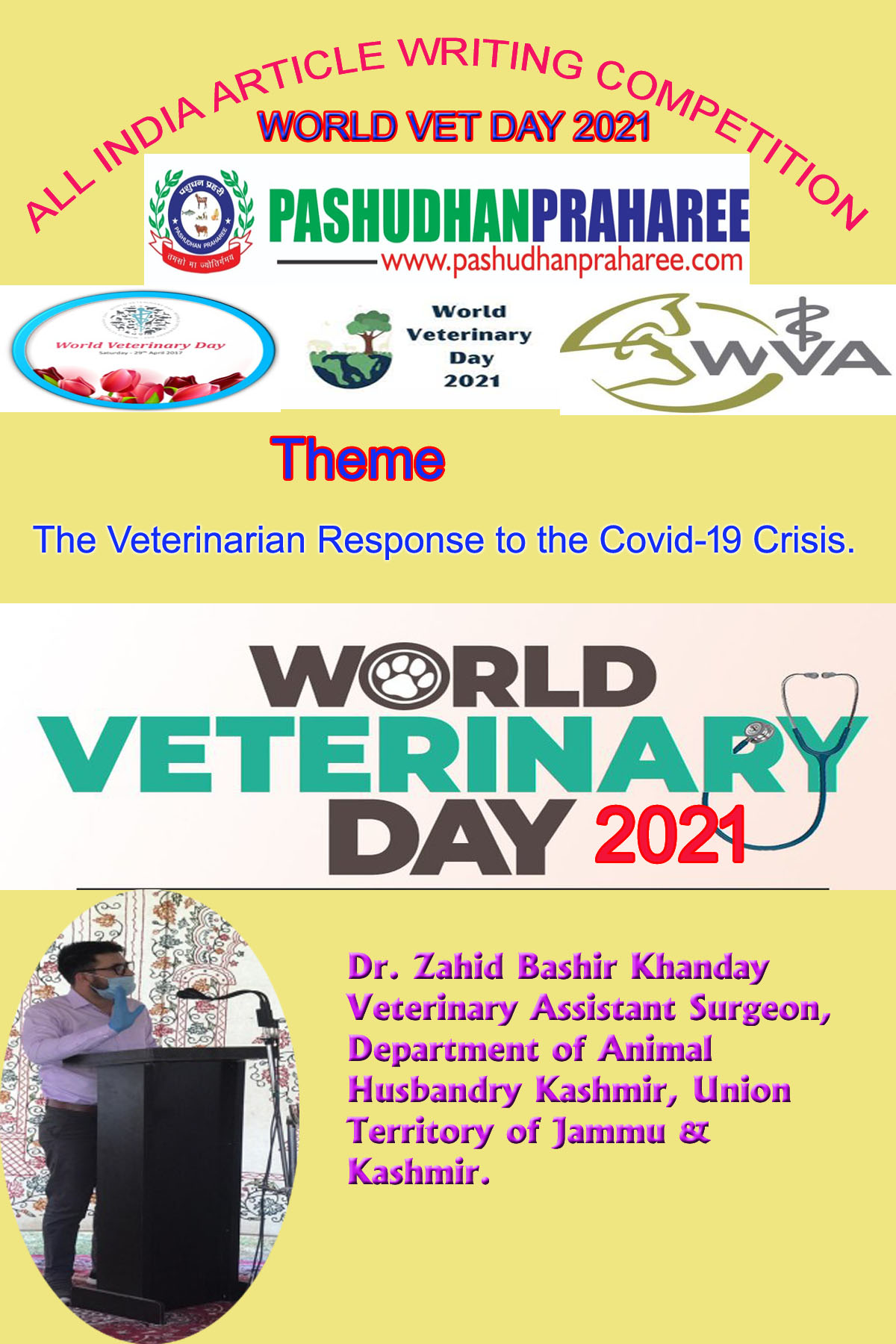The Veterinarian Response to the Covid-19 Crisis
- Introduction
The corona virus (COVID-19) pandemic, caused by SARS-CoV-2 (Severe Acute Respiratory Syndrome CoronaVirus 2) is considered as one of the most devastating and disasterous pandemics affecting more than 220 countries and territories in the world. The pandemic was known to spread because of negligence in the standards and biosafety models in the local food markets of Wuhan, Hubei province in China, where people were enjoying their local food eating habits including consumption of bats, snakes and pangolins. This favored the cross contamination and transmission of infectious corona viruses between the animals and from animals to humans. Finally it was identified as a severe outbreak of corona virus in humans after confirmation of certain mysterious cases of pneumonia in December 2019. Later on, World Health Organization (WHO) named this novel coronavirus pneumonia as “COVID-19” (Coronavirus disease 2019) on 11 February, 2020, and declared it as a pandemic in March, 2020. Till date, the pandemic has caused huge public health and economic losses world-wide including our country.
We’ve all had to change our lifestyle since COVID-19 entered our world. From how we work and operate our businesses, to how we stay connected with nears and dears, to how we simply move through our days, our lives are different. We have adapted quickly – juggling new procedures; altering services; and monitoring scientific developments, regulatory requirements, and economic impacts – for the sake of our patients, clients, colleagues, and our businesses. During this pandemic, veterinarians (Vets) played multiple roles for bringing out the people from this global health crisis via various ways. Veterinarians being an integral and essential part of the global health, offer diverse roles not only related to the health and welfare of animals. All these roles would rather make the routine work of the Vets but the current COVID-19 crisis has unmasked their potential and utility beyond that too in an effective way. To commemorate their role to the society, this year World Veterinary Day (WVD) is themed with “The Veterinarian Response to the Covid-19 Crisis”.
- The Veterinarian Response to the Covid-19 Crisis
Today’s veterinarians are the only doctors educated to protect the health of both animals and people. They work hard to address the health and welfare needs of every species of animal. Veterinarians also play critical roles in environmental protection, research, food safety, and animal health. The profession embraces this idea that the health of humans, animals and the environment is inextricably linked and supports the related call for transdisciplinary collaboration. Especially in zoonotic disease control, the benefits of the cooperation between veterinarians and human doctors seem evident. The COVID-19 pandemic, like SARS and MERS, indicates that health of humans, animals and the environment is inextricably linked and supports the need for transdisciplinary collaboration according to the One Health approach. Veterinarians have come forward to help the society in many ways, which can be broadly categorized as:
- Veterinarian’s Contribution towards Animal’s Health
The vets contributed towards the animal health in many ways like:
- Provision of essential services for livestock
During the pandemic, when all services were shut down due to lockdown. In this context, the World Organization for Animal Health (OIE) and the World Veterinary Association (WVA) advocate for the specific activities of Veterinary Services to be considered as essential businesses. Veterinarians provided constant and regular essential services in the form of diagnosis and treatment of sick animals, artificial insemination (NAIP Phase 1 and 2) in cattle and buffaloes, routine vaccination (NADCP Phase 1) and deworming programs. For non-emergency services, vets offered services through telemedicine. We simply cannot afford to compromise on animal health if we are to safeguard human health in this crisis.
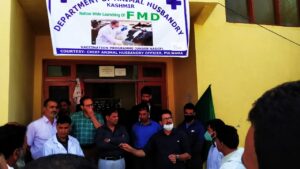
In Picture : Vaccination under NADCP Phase 1 during COVID-19 times
- Control and containment of Avian Influenza / Bird Flu
A bird flu alert was also sounded in states, including Kerala, Madhya Pradesh, Himachal Pradesh, Rajasthan, Haryana, Gujarat, and Jammu & Kashmir, which were already fighting their biggest battle against the novel coronavirus pandemic. Avian flu outbreak in India brings forth links to environment, animal and human health. Thus Veterinarians played a crucial role in control and containment of the Avian Influenza in these hard times.
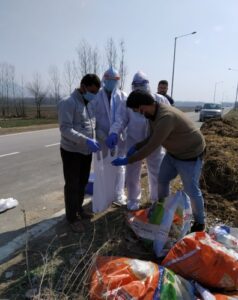
In Picture : Collection of Dead Birds From Roadsides for disposal.
- Provision of door step services for animals of containment and micro containment zones
Some of the veterinary hospitals had moved to client ‘concierge’ service like human hospitals did to limit person-to-person interaction. During setting up of micro containment zone, all entry and exit points of the zone are sealed except for essential services. Veterinarians deputed in these micro containment zones ensured the provision of uninterrupted supply of animal fodder, healthcare facilities for the domestic animals, motivation of people for sample testing and now vaccination, strict enforcement of home quarantine, contact tracing etc.
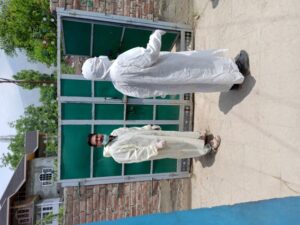
In Picture : Door services during COVID 19 times
- Welfare of stray animals
COVID 19 Pandemic caused stray animal welfare problems including increase in the number of stray animals (which leads to increased number of sick animals and thus increased mortality) and general discomfort (hunger, pain, thirst, fear, stress etc). To counteract with all these problems, veterinarians are working in collaboration with Non- Government Organizations (NGO’s) and animal welfare groups for the benefit of society via various ways viz. supply of feeds, treatment of sick and stray animals, vaccination of stray animals etc to prevent any cross contamination or transmission of infections from animals to humans, and vice-versa.
- Veterinarian’s Contribution towards Human’s Health
The vets contributed towards the Human health in many ways like:
- Food Safety
The COVID-19 pandemic threatens animal and plant-based food production domestically and globally. The pandemic threatens to disrupt global food supply chains and markets. Veterinarians are uniquely poised to help safeguard global food security and stability through contributing their expertise in food animal production, food safety, epidemiology and biosecurity. This expertise will prevent future pandemics and maintain public health infrastructure including the safety of people engaged in animal origin food production. Veterinarians need a seat at the table of discussions on strategies and models to improve national and global food security plans and emergency operation efforts. Veterinary care for food animals ensures their good health and thus, to food safety. Thus ensuring the production of safe livestock products, thereby safe guarding the health of humans. These livestock products are directly involved in protection of people from COVID-19 by stimulation of immune system, as these are rich sources of essential amino acids, proteins, minerals and vitamins. Since health experts of various countries have recommended more of these livestock products for enhancing the immunity of front line workers, health workers and corona patients, hence the demand of these products increased tremendously during the pandemic. Veterinarians worked hard round the clock by providing 24*7 hours essential services for ensuring a constant supply of these livestock products for boosting the immunity of population against this viral disease. Also these livestock products remained a constant source of income for poor farmers when they need it urgently
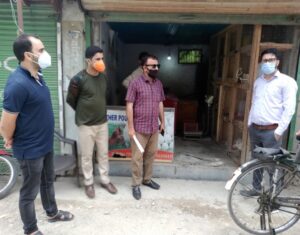
In Pictures: Checking of Prices during COVID 19 times
- Diagnosis and testing of COVID-19
Vets are well equipped with the scientific knowledge to handle the virus and perform associated diagnostic tests. As such the Vet man-power and their hospital machinery have really helped in testing COVD-19 timely. Due to vast human population in India, the increase in testing capacity is very important for early detection and contact tracing of infected people for isolation and quarantine measures. Many animal corona viruses such as porcine epidemic diarrhea virus (PED), SARS-CoV-1, MERS, Influenza viruses etc possess similar testing procedures as that of SARS-CoV-2, hence veterinarians possess vast experience in the field of RT-PCR testing in veterinary diagnostic labs across the world. Also due to heavy burden on human health systems, and in order to provide assistance to the overwhelmed human diagnostic labs, veterinary laboratories with modern diagnostic facilities have come forward for testing of COVID samples by RT-PCR technique.
- Development of COVID-19 vaccine
A new wave of Covid-19 has started and has affected many more lives and economies again. COVID-19 has reminded us that “we are one” and an opportunity has come to refocus on our health policies. Health sector sans borders and asks for cross-border collaboration. Across the world health oriented research transits from basic sciences to the veterinary and medical fields. Various sectors like the ones of medical, pharmaceutical and veterinary offer direct health services while other related sectors like agriculture, forestry and environment provide indirect services to the animals and human. All these fields have been forced to communicate, collaborate on and coordinate activities for “One Health” initiative. There has been a dream to see these sectors co-ordinate. During the current COVID-19 crisis when everything looks bleak, a ray of hope is visible through the collaborative and co-ordinated efforts of professionals from diverse fields to mitigate this pandemic. Veterinarians possess vast experience in the field of immunology in vaccine development for animal corona viruses other than SARS-CoV-2. Such joint efforts could finally turn fruitful when COVID-19 vaccines were developed. The best example to this is Pfizer-BioNTech COVID-19 vaccine, which is being produced by an American company Pfizer under the able guidance of its chief executive officer – Albert Bourla, who is a veterinarian. Dr. Albert Bourla has used his scientific research experience for the production of this vaccine, as a successful candidate against COVID-19.
- Delivery and administration of COVID-19 vaccine
Vets are not new to vaccination programmes as immunization in veterinary practice has been going-on since decades. Since veterinarians possess vast experience in the field of production, handling, storage, transportation, administration of animal vaccines and also the record keeping, hence their services are utmost important for public health point of view regarding delivery and administration of COVID-19 vaccine. Secondly, veterinarians are very well aware about the maintenance of cold chain and handling of vaccines. Hence their services are particularly important when health systems are badly challenged during this global crisis. Vets have now also been roped in to undertake the vaccination program. Seeing the reluctance of some of the sections in the society towards COVID-19 vaccination, vets are the potential candidates to guide and educate the common people why and how there can be vaccination failure and what can be repercussions, if any.
- Supply of life-saving equipment and devices to human hospitals
During sudden onset of pandemic, there was huge demand for safety gears and life-saving equipments and devices. During this crisis, veterinarians helped the society by donating ventilators, oxygen cylinders, RT-PCR machines, ultrasound machines, PPE kits etc from their well-equipped clinics and hospitals to the health authorities.
- Creation of awareness among animal owners
Though at present there is negligible evidence which shows that animals may be involved in spread of COVID-19 to humans, yet its possibility can’t be ruled out. Worldwide there are very few cases of COVID-19 reported in animals. In Spain, a cat owned by a COVID-19 affected patient was detected positive for SARS-CoV-2. Similarly, four tigers and two lions were confirmed positive for SARS-CoV-2 in New York’s Bronx zoo. Other animals which are suspected for SARS-CoV-2 infection are wild minks, civet cat, ferrets, dogs etc. Till date, whatever the research reports are available, it appears that in contrast to dogs, cats are more susceptible to SARS-CoV-2 infection. On the other hand, whether there is community transmission between farm workers and these animals or not – is still a big question? Hence there is a need of stringent research studies for confirmation of this unknown fact that how animals are affected by SARS-CoV-2 and further transmit the disease if it happens so. So meantime to tackle with this problem, veterinarians are playing great role in creating awareness among animal owners regarding maintenance of personal hygienic practices including washing of hands before and after handling of animals especially dogs and cats. Awareness is also being created for avoiding any physical contact (sleeping, eating or kissing the pet animals) or close contact (food items, equipments, utensils etc) with these animals. Also humans with suspected or confirmed COVID-19 test reports should avoid contact with animals including pets, livestock and wild life. Further, being part and parcel of the society with scientific background, vets role in maintaining the mental health and ensuring social distancing can’t be ignored. In time of crisis, one’s opinion matters and if it comes from doctor, results are more fruitful.
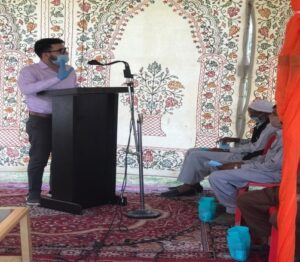
In Picture Author as a Master trainer of COVID 19 Awareness
- Miscellaneous services for the mankind
Due to heavy load of patients in medical hospitals during the pandemic, veterinarians in some countries, after proper training, are also assisting medical doctors for imparting various services to corona patients. These miscellaneous services include assistance in triage, monitoring of serious patients in ICU’s, administration of intravenous fluids and medicines, dispensing of medicines, placing of IV catheters, treatment of medical emergencies (hemostasis, bandaging, splinting), providing services for trauma and first aid conditions, cases etc. Considering veterinary curriculum and their acquaintance to the personal protective equipment (PPE), state or other administration across the world had put them to the task to ensure ‘isolation’ and other standard operating protocols (SOPs) to be implemented. The further activities include surveillance and monitoring, controlling movement of public during lockdown, imposing fines on SOP violators, market checking etc.
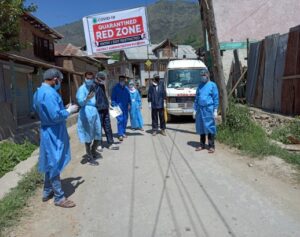
In picture Author Leading a Surveillance and Monitoring Team in a RED ZONE
- Conclusion
Veterinarians are playing multiple roles for the well-being of animals, humans and environment in this grappling world of COVID-19 pandemic. Though on one hand, world-wide many veterinarians lost their lives due to COVID-19 by serving the community, yet on the other hand, veterinarians have shown their professional values and commitment to the communities and One Health initiatives. Vets across the globe are engaged in research to understand the ecology of emerging zoonotic diseases that are transmitted between animals and humans. COVID-19 being an infectious disease with animal origin, joint efforts from veterinarians and other associated professional like medicos offer a long term solution to these problems. Now as second COVID-19 wave has started, it is crucial to priorities the activities in the veterinary sector. It’s imperative for the veterinary regulatory bodies to oversee the integrity of animal and public health through veterinary services in order to ensure: Animal health is not at stake and only healthy animals and their by-products enter the food supply to guarantee food safety for general population. Vets are effectively utilized through their specialization such as microbiologists/ biotechnologists for COVID-19 testing; extension workers for imparting knowledge to common people. In nutshell, Vets are self-less scientific people who take care not only for dumb creatures but for the society as a whole. Though a new wave of Covid-19 has started and has affected many more lives and economies again, furthering of set efforts and SOPs already proposed need to be followed. But sometimes tragedy brings out the best in people. For World Veterinary Day this year, I celebrated the day by appreciating and saluting all those frontline workers, COVID 19 warriors including those of the veterinary medical community including veterinary doctors, nurses and all the paraprofessionals in the pet health industry.
By: Dr. Zahid Bashir Khanday
Veterinary Assistant Surgeon, Department of Animal Husbandry Kashmir, Union Territory of Jammu & Kashmir.
Email: zbashir49@gmail.com
Permanent Address: Ward A, Astan Mohalla, 22- Meej Pampore Pulwama, Jammu & Kashmir (UT). Pin code: 192121


